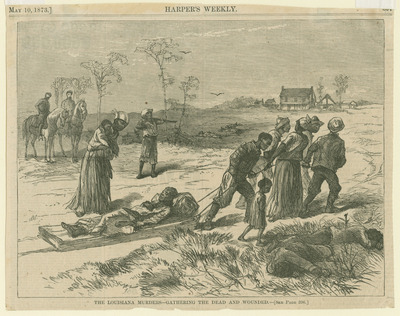The Roberts Court: Repealing Reconstruction

Leah Litman notes that Louisiana v. Callais, which intends to rule the Voting Rights Act unconstitutional. is really an attempt to repeal the First Reconstruction, as the VRA came out of the Second Reconstruction.
The story of Louisiana v Callais begins with the project of Reconstruction, the effort to reconstitute the United States after the civil war and the end of slavery. Reconstruction was an ambitious undertaking that sought to integrate Black Americans into the polity and to protect their rights against the states and political movements that already wanted to claw them back on the heels of the civil war.
Part of this era entailed the passage and ratification of the Reconstruction amendments – the 13th, 14th and 15th amendments that outlawed slavery, guaranteed equal protection, and prohibited racial discrimination in voting, among other things. The people who drafted the 15th amendment saw the measure as a way to allow Black voters “to choose from among his fellow citizens the man who suits him for his representative”, as senator John F Edmunds put it in 1869. As Justice Ketanji Brown Jackson detailed in an oral argument a few years ago, a report submitted by a congressional committee on Reconstruction said “that the entire point” of the project was to secure rights of formerly enslaved people. “The legislature who introduced [the 14th] amendment said: ‘Unless the constitution should restrain them, those states will all, I fear, keep up this discrimination and crush to death the hated freedmen,’” Jackson said.
Reconstruction was an ambitious project that produced real gains. Within a few years, former Confederate states sent Black representatives and senators to Congress and elected Black leaders to state political offices. The federal military conducted voter registration drives in the south; through Freedmen’s Bureau offices, the federal government helped set up thousands of schools that educated hundreds of thousands of children who had been enslaved.
In part because of these successes, Reconstruction encountered resistance that became violent. That included the rise of the Ku Klux Klan, which enforced racial hierarchy through a campaign of terror.
The many varied opponents of Reconstruction channeled several talking points. One was the idea that the very project of Reconstruction was too radical and had to be limited so as to preserve a pre-existing constitutional order of white supremacy that Reconstruction had sought to remake. The anti-Reconstruction movement scored important victories with supreme court decisions from the late 1800s that narrowly interpreted provisions in the 14th amendment and weakened the federal government’s oversight of states’ regulation of elections.
Another anti-Reconstruction trope was the notion that federal civil rights protections were no longer needed since slavery was a thing of the past. And, this line of argument continued, because federal protections for Black freedmen were unnecessary, retaining the protections was actually unfair to the people who were prohibited from disenfranchising or discriminating against them. Along these lines, when Andrew Johnson vetoed a congressional statute, he insisted that since slavery had been “abrogated”, federal protections for freedmen therefore “operated in favor of the colored and against the white race”. When the supreme court invalidated the Reconstruction-era Civil Rights Act in 1883, it, too, insisted that the time for federal civil rights protections for freedmen was up, since “there must be some stage in the progress of [freedmen’s] elevation when he takes the rank of a mere citizen and ceases to be the special favorite of the laws.” (This was less than two decades after the end of the civil war.)
In short, opponents of Reconstruction tried to weaponize the principles of Reconstruction against it. Southern sympathizers maintained that prohibiting former Confederate states and Confederates from discriminating against Black Americans was itself a kind of discrimination – discrimination against the Confederate states and would-be discriminators.
This logic has endured: decades later, white business owners even challenged the 1964 Civil Rights Act, which prohibits businesses from engaging in racial discrimination, as a violation of the 13th amendment, which prohibits slavery and involuntary servitude.
The fun part will be Clarence Thomas writing the opinion.


